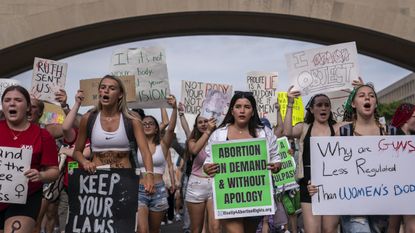The countries where abortion is legal – and where it’s illegal
Millions of US women have lost their right to terminate pregnancies following Supreme Court ruling

The overturning of the landmark Roe vs. Wade ruling is set to strip women across the US of their constitutional right to abortion.
The Supreme Court’s decision to reverse the 1973 ruling hands powers to crack down on abortion to the nation’s 50 states – of which “half are expected to introduce new restrictions or bans”, the BBC reported. A total of 13 have already passed “trigger” laws to automatically outlaw abortion if federal protections are overturned, the broadcaster added.
In Red states where abortion has not been automatically banned, it seems that “inevitably conservative state legislatures and governors will pass additional restrictions in the coming weeks and months”, added The Guardian.
Subscribe to The Week
Escape your echo chamber. Get the facts behind the news, plus analysis from multiple perspectives.

Sign up for The Week's Free Newsletters
From our morning news briefing to a weekly Good News Newsletter, get the best of The Week delivered directly to your inbox.
From our morning news briefing to a weekly Good News Newsletter, get the best of The Week delivered directly to your inbox.
So far, eight states have already banned access to abortion in all but extremely limited circumstances, while in another ten states bans or severe restrictions are expected to be in place soon, according to the paper’s tracker of abortion laws in the US. In another 12, access to abortion is threatened, while it remains legal in 20 states and Washington DC.
Some 36 million US women of reproductive age will be cut off from abortion access, according to the healthcare organisation Planned Parenthood.
Which countries have the strictest abortion laws?
According to the Centre for Reproductive Rights, 24 countries globally do not permit abortion under any circumstances, including when the woman’s life or health is at risk.
Strongly Catholic Malta is the only European country to have a total ban on abortion. However, in practice, doctors will give life-saving treatment to a mother even if an embryo or foetus is harmed or aborted as a result. That’s despite the Maltese Criminal Code making doctors liable for up to four years in prison if they cause a miscarriage.
A survey carried out in 2018 by Malta Today suggested that liberalisation in the country is a long way off. Overall, 95.2% of those surveyed were opposed to abortion by request – known as elective abortion – even if it were restricted to the first 12 weeks of pregnancy. Less than half said that abortion should be allowed to save the life of the mother.
Unsurprisingly, abortion is also totally banned in Vatican City – however, given that the Holy See’s 800-strong population is overwhelmingly made up of Catholic clerics, this prohibition is largely theoretical.
Abortion access has also been severely rolled back in Poland with its Constitutional Tribunal ruling in 2020 that women can only undergo an abortion in cases of rape, incest or danger to their life.
Where is elective abortion legal?
At the other end of the scale, 72 countries and territories permit women to terminate their pregnancies at their request, according to the CRP, although usually with some conditions – most commonly, a time limit on when the procedure can be performed.
Canada is the only Western nation where a woman can seek an elective abortion at any time in her pregnancy, although in practice only a handful of terminations occur during the third trimester, HuffPost reports.
What about the UK?
Theoretically, women in all parts of the UK are legally able to obtain an abortion up to 24 weeks into their pregnancy. Terminations can be performed after this limit in exceptional circumstances, such as to save the life of the mother or because of a severe foetal abnormality.
However, in reality, there are still barriers to accessing abortion in Northern Ireland and Scotland.
Abortion was legalised in Northern Ireland in October 2019, bringing abortion laws in the area in line with the rest of the UK, after its devolved power-sharing executive in Stormont failed to reform in order to veto the new legislation.
But functioning abortion services in Northern Ireland are yet to be commissioned. This is mainly due to the refusal of Northern Ireland’s health minister, Robin Swann, to comply, despite demands from Northern Ireland Secretary Brandon Lewis to do so by March 2022.
Swann claims he is not able to establish services without a functioning executive.
In Scotland, some 170 Scottish women have been sent to England to access abortion services since 2019, reported Lucy Grieve, the co-founder of Back Off Scotland, a campaign group fighting for the right to harassment-free access to abortion, in The Scotsman.
“As it stands there is no health board in Scotland that provides abortion care up to the longstanding legal limit of 24 weeks to the women in its area,” Grieve reported, arguing that the Scottish government “has singularly failed to seek the commissioning of later services, facilitate the training of doctors, or exercise the political will to ensure that these women can access abortion care closer to home”.
Speaking to The Guardian, she said that some health boards in Scotland stopped significantly short of the 24-week limit, with services in Fife available only up to 15 weeks.
Office for National Statistics and Department of Health and Social Care figures show that in 2021, 214,869 abortions were performed in England and Wales, and there were 625,008 live births.
Figures like these are often used to claim that more than 20% of all pregnancies are terminated. However, The Journal points out that this statistic is misleading as it does not take into account the thousands of pregnancies which end in miscarriage every year.
Create an account with the same email registered to your subscription to unlock access.
Sign up for Today's Best Articles in your inbox
A free daily email with the biggest news stories of the day – and the best features from TheWeek.com
-
 Who actually needs life insurance?
Who actually needs life insurance?The Explainer If you have kids or are worried about passing on debt, the added security may be worth it
By Becca Stanek, The Week US Published
-
 Sexual wellness trends to know, from products and therapies to retreats and hotels
Sexual wellness trends to know, from products and therapies to retreats and hotelsThe Week Recommends Talking about pleasure and sexual health is becoming less taboo
By Theara Coleman, The Week US Published
-
 Is the AI bubble deflating?
Is the AI bubble deflating?Today's Big Question Growing skepticism and high costs prompt reconsideration
By Joel Mathis, The Week US Published
-
 Myanmar: the Spring Revolution and the downfall of the generals
Myanmar: the Spring Revolution and the downfall of the generalsTalking Point An armed protest movement has swept across the country since the elected government of Aung San Suu Kyi was overthrown in 2021
By The Week Staff Published
-
 Israel hits Iran with retaliatory airstrike
Israel hits Iran with retaliatory airstrikeSpeed Read The attack comes after Iran's drone and missile barrage last weekend
By Peter Weber, The Week US Published
-
 Is there a peaceful way forward for Israel and Iran?
Is there a peaceful way forward for Israel and Iran?Today's Big Question Tehran has initially sought to downplay the latest Israeli missile strike on its territory
By Sorcha Bradley, The Week UK Published
-
 In what states is abortion legal, illegal, and in limbo?
In what states is abortion legal, illegal, and in limbo?In The Spotlight Where American states stand on abortion care
By Theara Coleman, The Week US Published
-
 'Good riddance to the televised presidential debate'
'Good riddance to the televised presidential debate'Instant Opinion Opinion, comment and editorials of the day
By Harold Maass, The Week US Published
-
 Sudan on brink of collapse after a year of war
Sudan on brink of collapse after a year of warSpeed Read 18 million people face famine as the country continues its bloody downward spiral
By Peter Weber, The Week US Published
-
 How powerful is Iran?
How powerful is Iran?Today's big question Islamic republic is facing domestic dissent and 'economic peril' but has a vast military, dangerous allies and a nuclear threat
By Harriet Marsden, The Week UK Published
-
 'This isn't judicial restraint — it's judicial activism'
'This isn't judicial restraint — it's judicial activism'Instant Opinion Opinion, comment and editorials of the day
By Harold Maass, The Week US Published